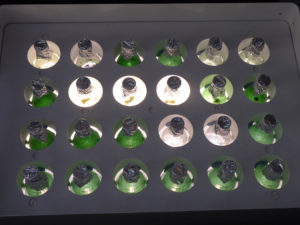Largest algae conference in the world now accepting abstracts and proposals for advances in algae for food and feed, biofuels and biomaterials, water, air and soil
Orlando, Fla., (December 13, 2018) The Algae Biomass Organization (ABO), the trade association for the algae industry, announced today that the 2019 Algae Biomass Summit will take place in Orlando, Florida, September 16-19, 2019 at the Rosen Centre Hotel. The annual Summit is the world’s largest gathering of algae scientists, entrepreneurs, investors, government officials, and Fortune 500 companies that are adopting algae into their products and operations. Information about the event and call for abstracts can be found at http://www.algaebiomasssummit.org.
The Summit has become the go-to conference for commercial algae producers, the scientific community, and algae product developers that are unlocking the potential of algae agriculture to provide a more sustainable source of food, feed, biofuel, nutritional supplements, advanced materials like plastics and foams, pharmaceuticals and more.
The event also highlights promising applications of algae – such as wastewater treatment, nutrient management, and carbon capture and use – to safeguard our water, air and soil, including solutions to algae blooms facing Florida and other parts of the world.
“Algae are remarkable organisms, capable of feeding, fueling and clothing the world while simultaneously restoring our clean air and water,” said Matt Carr, ABO executive director. “The Summit is going to bring hundreds of people from around the world dedicated to using algae as a solution to countless challenges in water use, food production, energy and more.”
“As in 2018, new products and new innovations in food and feed, health and nutrition, and biofuels and biomaterials will be a major focus of the 2019 Summit,” said Carr. “But we will also highlight water treatment, nutrient management, carbon capture and algae mitigation technologies essential to addressing Florida’s twin challenges of climate change and water quality.”
The ABO is now accepting abstracts for at the Summit. Abstracts submitted before the January 31, 2019, priority deadline will receive preferred evaluation by the event’s planning committee.
This year the Summit’s focus topics will include product and technology innovations in:
- Food, Nutrition, Health & Beauty
- Animal Feed & Animal Health
- Water & Nutrient Management
- Soil & Sustainable Agriculture
- Carbon Capture & Use
- Fuels & Energy
- Chemicals, Materials & Plastics
- Resource Extraction & Bioremediation
Speakers and attendees at the Algae Biomass Summit will include national and international technologists, senior executives of algae producers and product developers, marketers, students researching algae science and cultivation methods, as well as local and federal policy makers tasked with advancing technology, business or solving environmental challenges.
The Summit has also become a nexus for algae industry professionals seeking to make new connections and continue to build on their successes. The event includes receptions and VIP events that offer daily networking opportunities, as well as an Algae Product Showcase that demonstrates the business case for using algae in a wide range of consumer and industrial applications. A Young Innovator’s Lounge offers career advancement opportunities for a new generation of algae professionals, and exclusive tours of regional algae R&D and commercial operations to give attendees a chance to see algae applications first-hand.
About the Algae Biomass Organization
The Algae Biomass Organization (ABO) is a 501(c)(6) non-profit whose mission is to promote the development of viable commercial markets for renewable and sustainable commodities derived from algae. Its membership is comprised of people, companies and organizations across the value chain. More information about ABO, including its leadership, membership, costs, benefits and members and their affiliations, is available at the website: www.algaebiomass.org.

 Did you visit us at this year’s Algae Biomass Organization (ABO) Summit in Texas? Attendees were able to see our Algem® photobioreactor in action, and speak to us about our multiparametric optimization.
Did you visit us at this year’s Algae Biomass Organization (ABO) Summit in Texas? Attendees were able to see our Algem® photobioreactor in action, and speak to us about our multiparametric optimization. A new
A new 